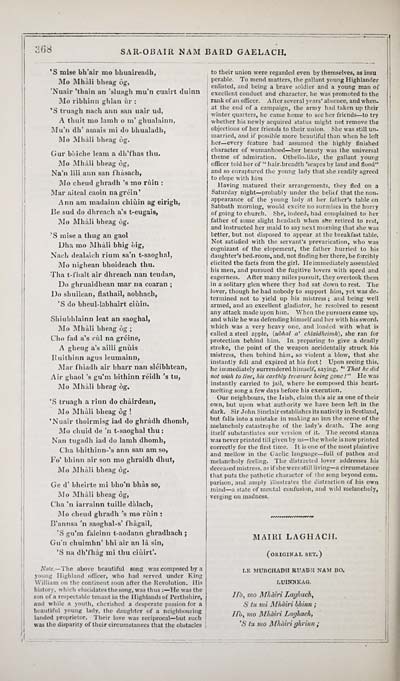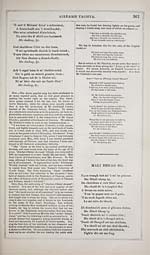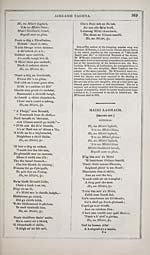Download files
Complete book:
Individual page:
Thumbnail gallery: Grid view | List view

:H)6
SAR-013AIR NAM BARD GAELACH.
'S mise bh'air mo bhuaiieadh,
Mo Mhàli blieag òg,
'Nuair 'thain an 'sluagh mu'n cuairt duinu
Mo ribhiiiii glilaii ùr :
'S truagh nach aim sail uair uil,
A tbuit mo lainh o m' ghualaiiiii,
ÌMu'ii dh' amais ini do bhualadh,
Bio Mhàli bheag òg.
Gur bùicbe leam a dli'fhas thu.
Mo iSIhàli blieag òg,
Na'ii lili anil san fhàsach,
INIo cheud ghradh 's mo ruin :
Mar aitcal caoin nagrein'
Ann am madaiiin chiùin ag eirigh,
Be Slid do dlireach a's t-eugais,
]Mo Mhàli bheag òg.
'S mise a Uiug an gaol
Dha mo Mhàli bhig òig,
Nach dealaich rium sa'n t-saoghal,
Mo nighean bhoideach tbu.
■Tha t-fhalt air dhreach nan teudan,
Uo ghruaidbean mar na coaran ;
Do shuilean, flatbail, aobhach,
'S do bheul-labhairt ciùin.
Shiublilainn leat an saoghal,
Mo INIhàli bheag òg ;
Clio fad a's ciil na greine,
A glieug a's ailli gnùis
Huithinn agus leumainn,
Mar fhiadh air bharr nan sleibhtean,
Air ghaol 's gu'm bithinn reidh 's tu,
Mo Mhàli bheag òg.
'S truagh a rinn do chàirdean,
Mo Mhàli bheag òg !
'Nuair thoirmisg iad do ghradh dhomli,
Mo cliuid de 'n t-saoghal thu:
Nan tugadh iad do lamh dhomh,
Cha bhithinn-'s ann sail am so,
Fo' bliinii air son mo ghraidh dhut,
Mo Mhàli bheag òg.
Ge d' bheirte mi bho'n bhàs so,
Mo Mhàli bheag eg,
Cha 'n iarrainn tuille dàlach.
Mo cheud ghradh 's mo ruin t
D'aiinsa 'n saoghal-s' fhàgail,
'S gu'm faicinn t-aodann ghradhach ;
Gu"n chuimhn' bhi air an la sin,
'S na dh'fhàg mi thu ciùirt'.
Noie.—Thc above beautiful song was composed by a
young HiglilaiKl oHicer, who had served under King
William on Ihc continent soon after the licvolution. His
history, which elucidatesthesong, was thus :— He was the
eon of a respectable tenant in the Highlands of Perthshire,
and while a youth, cherished a desperate passion for a
bea\itifiil young lady, the daughter of a ncichliouiiiig
landed proprietor. Their love was reciprocal— but such
was the disparity of their circumstances that the obstacles |
to their union were regarded even by themselves, as insu
perable. To mend matters, the gallant young Highlander
enlisted, and being a brave soldier and a young man of
excL'Iknt conduct and character, he was promoted to the
rank of an officer. .After several years' absence, and when,
at the end of a campaign, the army had taken up their
winter quai tors, he came homo to sec her friends — to try
whether his newly acquired status might not remove the
objections of her friends to their union. She was still un.
married, and if possible more beautiful than when he left
her— every feature had assumed the highly finished
character of womanhood — her beauty was the universal
theme of admiration. Othello-like, the gallant young
officer told her of " hair.brcadtli 'scapes by land and flood"
and so enraptured the young lady that she readily agreed
to elope with him
Having matured their arrangements, tiicy fled on a
Saturday night— iirobably under the belief that the non.
appearance of the young lady at her father's table on
Salibath morning, would excite no surmises in thehuny
of going to church. .She, indeed, had complained to her
father of some slight bcadach when she retired to rest,
and instructed her maid to say next morning that she was
better, but not disposed to appear at the breakfast table.
Not satisfied with the servant's prevarication, who was
cognizant of the elopement, the father hurried to his
daughter's bed.room, and, not finding her there, be forcibly
elicited the facts from the girl. He immediately assembled
his men, and pursued the fugitive lovers with speed and
eagerness. After many miles pursuit, they overtook them
in a solitary glen where they had sat down to rest. The
lover, though he had nobody to support liini, yet was de-
termined not to yield up his mistress ; and being well
armed, and an excellent gladiator, he resolved to resent
any attack made upon him. Wheji the pursuers came up,
and while he was defending himself and her with his sword,
which was a very heavy one, and loaded with what is
called a steel apple, (ubhal a' chlaidheimh), she ran for
protection behind him. In preparing to give a deadly
stroke, the point of the weapon accidentally struck his
mistress, then behind him, so violent a blow, that she
instantly fell and expired at his feet ! Upon seeing this,
he immediately surrendered himself, saying, " That he did
not wish to live, his earthly treasure being i;one .'" He was
instantly carried to jail, where he composed this heart-
melting song a few days before his execution.
Our neighbours, the Irish, claim this air as one of their
own, but upon what authority we have been left in the
dark. Sir John Sinclair establishes its nativity in Scotland,
but falls into a mistake in making an inn the scene of the
melancholy catastrophe of the lady's death. The song
itself substantiates our version of it. The second stanza
was never printed till given by us— the whole is now printed
correctly for the first time. It is one of the most plaintive
and mellow in the Gaelic language— full of pathos and
melancholy feeling. Tlie distracted lover addresses his
deceased mistress, as if she were still living— a circumstance
that puts the pathetic character of the song beyond com-
parison, and amply illustrates the distraction of his own
mind— a state of mental confusion, and wild melancholy,
verging on madness.
MAIRI LAGIIACII.
(omr.INAI. SET.)
I,E MUBCIIADII R1I.'»»!1 NAM BO.
LUirrNKAG.
//b, mo Mliàiri Layliach,
S tu mi Mhàiri hhinn ;
Ilh, mo Mhàiri Laghach,
'S tu mo ]\lhàiri ghrinn ;
SAR-013AIR NAM BARD GAELACH.
'S mise bh'air mo bhuaiieadh,
Mo Mhàli blieag òg,
'Nuair 'thain an 'sluagh mu'n cuairt duinu
Mo ribhiiiii glilaii ùr :
'S truagh nach aim sail uair uil,
A tbuit mo lainh o m' ghualaiiiii,
ÌMu'ii dh' amais ini do bhualadh,
Bio Mhàli bheag òg.
Gur bùicbe leam a dli'fhas thu.
Mo iSIhàli blieag òg,
Na'ii lili anil san fhàsach,
INIo cheud ghradh 's mo ruin :
Mar aitcal caoin nagrein'
Ann am madaiiin chiùin ag eirigh,
Be Slid do dlireach a's t-eugais,
]Mo Mhàli bheag òg.
'S mise a Uiug an gaol
Dha mo Mhàli bhig òig,
Nach dealaich rium sa'n t-saoghal,
Mo nighean bhoideach tbu.
■Tha t-fhalt air dhreach nan teudan,
Uo ghruaidbean mar na coaran ;
Do shuilean, flatbail, aobhach,
'S do bheul-labhairt ciùin.
Shiublilainn leat an saoghal,
Mo INIhàli bheag òg ;
Clio fad a's ciil na greine,
A glieug a's ailli gnùis
Huithinn agus leumainn,
Mar fhiadh air bharr nan sleibhtean,
Air ghaol 's gu'm bithinn reidh 's tu,
Mo Mhàli bheag òg.
'S truagh a rinn do chàirdean,
Mo Mhàli bheag òg !
'Nuair thoirmisg iad do ghradh dhomli,
Mo cliuid de 'n t-saoghal thu:
Nan tugadh iad do lamh dhomh,
Cha bhithinn-'s ann sail am so,
Fo' bliinii air son mo ghraidh dhut,
Mo Mhàli bheag òg.
Ge d' bheirte mi bho'n bhàs so,
Mo Mhàli bheag eg,
Cha 'n iarrainn tuille dàlach.
Mo cheud ghradh 's mo ruin t
D'aiinsa 'n saoghal-s' fhàgail,
'S gu'm faicinn t-aodann ghradhach ;
Gu"n chuimhn' bhi air an la sin,
'S na dh'fhàg mi thu ciùirt'.
Noie.—Thc above beautiful song was composed by a
young HiglilaiKl oHicer, who had served under King
William on Ihc continent soon after the licvolution. His
history, which elucidatesthesong, was thus :— He was the
eon of a respectable tenant in the Highlands of Perthshire,
and while a youth, cherished a desperate passion for a
bea\itifiil young lady, the daughter of a ncichliouiiiig
landed proprietor. Their love was reciprocal— but such
was the disparity of their circumstances that the obstacles |
to their union were regarded even by themselves, as insu
perable. To mend matters, the gallant young Highlander
enlisted, and being a brave soldier and a young man of
excL'Iknt conduct and character, he was promoted to the
rank of an officer. .After several years' absence, and when,
at the end of a campaign, the army had taken up their
winter quai tors, he came homo to sec her friends — to try
whether his newly acquired status might not remove the
objections of her friends to their union. She was still un.
married, and if possible more beautiful than when he left
her— every feature had assumed the highly finished
character of womanhood — her beauty was the universal
theme of admiration. Othello-like, the gallant young
officer told her of " hair.brcadtli 'scapes by land and flood"
and so enraptured the young lady that she readily agreed
to elope with him
Having matured their arrangements, tiicy fled on a
Saturday night— iirobably under the belief that the non.
appearance of the young lady at her father's table on
Salibath morning, would excite no surmises in thehuny
of going to church. .She, indeed, had complained to her
father of some slight bcadach when she retired to rest,
and instructed her maid to say next morning that she was
better, but not disposed to appear at the breakfast table.
Not satisfied with the servant's prevarication, who was
cognizant of the elopement, the father hurried to his
daughter's bed.room, and, not finding her there, be forcibly
elicited the facts from the girl. He immediately assembled
his men, and pursued the fugitive lovers with speed and
eagerness. After many miles pursuit, they overtook them
in a solitary glen where they had sat down to rest. The
lover, though he had nobody to support liini, yet was de-
termined not to yield up his mistress ; and being well
armed, and an excellent gladiator, he resolved to resent
any attack made upon him. Wheji the pursuers came up,
and while he was defending himself and her with his sword,
which was a very heavy one, and loaded with what is
called a steel apple, (ubhal a' chlaidheimh), she ran for
protection behind him. In preparing to give a deadly
stroke, the point of the weapon accidentally struck his
mistress, then behind him, so violent a blow, that she
instantly fell and expired at his feet ! Upon seeing this,
he immediately surrendered himself, saying, " That he did
not wish to live, his earthly treasure being i;one .'" He was
instantly carried to jail, where he composed this heart-
melting song a few days before his execution.
Our neighbours, the Irish, claim this air as one of their
own, but upon what authority we have been left in the
dark. Sir John Sinclair establishes its nativity in Scotland,
but falls into a mistake in making an inn the scene of the
melancholy catastrophe of the lady's death. The song
itself substantiates our version of it. The second stanza
was never printed till given by us— the whole is now printed
correctly for the first time. It is one of the most plaintive
and mellow in the Gaelic language— full of pathos and
melancholy feeling. Tlie distracted lover addresses his
deceased mistress, as if she were still living— a circumstance
that puts the pathetic character of the song beyond com-
parison, and amply illustrates the distraction of his own
mind— a state of mental confusion, and wild melancholy,
verging on madness.
MAIRI LAGIIACII.
(omr.INAI. SET.)
I,E MUBCIIADII R1I.'»»!1 NAM BO.
LUirrNKAG.
//b, mo Mliàiri Layliach,
S tu mi Mhàiri hhinn ;
Ilh, mo Mhàiri Laghach,
'S tu mo ]\lhàiri ghrinn ;
Set display mode to: Large image | Transcription
Images and transcriptions on this page, including medium image downloads, may be used under the Creative Commons Attribution 4.0 International Licence unless otherwise stated. ![]()
| Early Gaelic Book Collections > Hew Morrison Collection > Sar-obair nam bard gaelach, or, The beauties of Gaelic poetry > (448) |
|---|
| Permanent URL | https://digital.nls.uk/76656180 |
|---|
| Description | A selection of items from a collection of 320 volumes and 30 pamphlets of literary and religious works in Scottish Gaelic. From the personal library of Hew Morrison, the first City Librarian of Edinburgh. |
|---|
| Description | Selected items from five 'Special and Named Printed Collections'. Includes books in Gaelic and other Celtic languages, works about the Gaels, their languages, literature, culture and history. |
|---|

